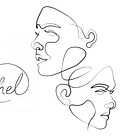Rachel
and her profound self-worth
Mazal tov! 🎉 This is our 100th XL Post since we launched in April of 2021!
It’s a privilege and honor to share Hashem’s wisdom for modern life with you. Thank you for reading and for helping us grow to over 3,000 subscribers around the world.
I am committed to continue writing as long as I know people are reading what I’m writing and finding it valuable and enriching for their lives. This is what moves me.
Here’s to the next 100!
Rachel’s life was painfully complex.
Aside from the pain of wanting desperately to have children and being unable to for a full decade…
Aside from knowing that this meant that she might never merit to become a matriarch of the nation of Israel that had been foretold prophetically to her husband’s grandfather Abraham, repeated to her father-in-law Isaac, and repeated once again to her husband directly…
In addition to this indescribable pain in its own right, she was also tangled up in the terrible complexity of having to share her husband with a co-wife, who was her sister, and two additional surrogate mothers, whom she and her sister had offered in an effort to increase their share as matriarchs.1
All of this complexity was deepened by the understanding that she brought this upon herself.
The Talmud tells us the behind the scenes story of how things unfolded.
(If you’re already familiar with it, read on for a critical twist that most people completely miss.)
Yaakov and Rachel’s story is unexpectedly but undeniably one of love at first sight.
When Yaakov saw Rachel, the daughter of his uncle Lavan, and the flock of his uncle Lavan, Yaakov went up and rolled the stone off the mouth of the well, and watered the flock of his uncle Lavan. Yaakov kissed Rachel, and broke into tears…
Yaakov loved Rachel, and answered, “I will serve you seven years for your younger daughter Rachel.”
Yaakov already knew that Lavan, Rachel’s father would try to pull a fast one on him. Rachel’s sister Leah was older than her, and Lavan would do everything he could to ensure that she was married before Rachel was. Yaakov, in turn, reassured Rachel that he was “her father’s brother,” which of course, he was not — at least not genetically. Lavan was, in fact, Yaakov’s uncle. What he meant by this was, “I can play ball with your dad” — “we are brothers and peers in the art of deception.” And he went on to present to Rachel his plot to protect himself against Lavan’s scam.
Yaakov provided Rachel with a code. What was the code? For the sake of telling the story, let’s just suggest he provided her with certain fragrance she would wear the night of the wedding.2
The plan was seemingly foolproof. Only two people knew about the code: Yaakov and Rachel — the two people who cared most that their secret should be kept. How could anyone ever get ahold of it?
Something changed. Rachel saw her father’s resolve to marry off Leah to Yaakov. Rachel realized that she could not stand on the sidelines and watch her sister, who apparently was unaware of what was happening, suffer the mortification of being asked for this code from her groom and not know it, being sent back to her parents on the night of her wedding.
With a subtle shpritz of the perfume given to her by Yaakov as Leah went off to be wed, Rachel went ahead and gave her the code.3
It was only when morning came that suddenly Jacob realized that it was Leah he had married, so he said to Laban, “What have you done to me? Was it not for Rachel that I worked for you? Why did you deceive me?”
Leave aside the completely valid, technical questions of how Yaakov didn’t recognize immediately that it was a different woman than the one he had proposed to.4 There is a question that is more essential to our understanding of who Rachel and Leah were:
Did Leah know that Rachel was giving her the code?
The Talmud does not weigh in on this question explicitly, but perhaps it is so obvious that it didn’t have to say it. Let me show you where it becomes clear in the Torah itself that Leah did not know:
Lavan’s response to Yaakov was that it was Yaakov who was in the wrong for even thinking that it would be appropriate that Rachel, the younger sister should get married before Leah. Despite this, because Lavan’s such a generous and understanding person, he would allow him to marry Rachel a week later in exchange for another seven years of work, since after all, he was getting two wives for the price of one.
So now, we have this exquisitely complex family dynamic. Yaakov is married to a woman he didn’t choose to marry, but he is unwilling to ruin her life by divorcing her. At the same time, he is now married to her sister whom he very much did want to marry, but is now a co-wife to another.
Meanwhile, Leah is suffering because her husband, although kind and compassionate, would have preferred to not marry her. She prays with all her soul, and Hashem answers her prayer with four sons,5 at which point she stops getting pregnant. Rachel, now desperate, offers her maidservant Bilhah as a surrogate mother, probably inspired by the actions of her grandmother-in-law Sarah. Bilhah successfully gives birth to two boys, which on the one hand is gratifying to Rachel, but on the other, highlights her barrenness — not unlike the way it did for Sarah.
Leah, inspired by Rachel, offers her own maidservant Zilpah as a surrogate mother, and also gives birth to two sons.
Rachel remains childless.
At this point, the Torah takes a break to record an extremely uncomfortable conversation, to say the least, between Rachel and Leah. Reuven, Leah’s oldest son had picked wild mandrake flowers for his mother. Rachel approaches Leah and asks if she could have some of them. Here is Leah’s response:
She answered her, “Is it not bad enough that you have taken away my husband? Do you have to also take away my son’s mandrakes?”
Uh…what?
How could you possibly say this to your sister who saved you from the worst humiliation you could have ever suffered, and is so desperate for children of her own that she asks you to share some of the tender gift you received from your oldest of four sons?
It must be that Leah does not know what Rachel did for her.6 How else could she allow such words to leave her mouth? If anything, Leah stole Rachel’s husband!
What did Rachel say back to her?
Did she lace into her? “How could you say such a thing after what I did for you?!”
No. This is Rachel’s response:
…Rachel replied, [“Tonight it is my turn to engage in marital relations with Yaakov, but since I would rather have those mandrakes,] therefore I propose that Yaakov be with you tonight, in exchange for your son’s mandrakes.”
She said nothing to Leah.
Not a word.
What is the Torah telling us here about who Rachel was?
Have you heard of the person who trained and ran a marathon but never told anyone about it?
Me neither.
It is human nature to feel the need to share with others the things that we do that we think are important and therefore deserving of others’ recognition.
The irony is that if we truly believed that what we were doing was worth doing, we wouldn’t need anyone else’s validation. On the contrary, telling people about it would diminish our sense of its importance precisely because we felt the need for others to know what we did.7
How much more so do we feel the need to tell people about things we did for them?
Here, we crave not only recognition and validation, but also appreciation and gratitude.
What if the person for whom you did a great secret kindness tells you off? What if it becomes so clear not only that they don’t know what you did for them, but that they are accusing you of doing the exact opposite? Would you be able to control yourself from throwing it back in their face by informing them of all that you’ve done for them?
This is exactly what Rachel did. With that subtle shpritz of perfume, she saved her sister from humiliation as the love of her life was being taken from her without her knowing. If she was going to save her from shame, let her be saved the shame of knowing the favor that was being done for her. In all those years, she didn’t in so much as hint as to what she had done, and when her sister accused her of doing the exact opposite
The Talmud frames its account of this episode of Rachel with the notion of your descendants receiving what is due to them from your actions. Because Rachel was modest-צנועה she merited to have King Shaul and Queen Esther come from her — both of whom were royalty but also modest.
Note that modesty here has nothing to do with modest dress, which is most people’s association with the word “modesty.” In what way was Rachel modest? And why does modesty produce royalty?
In Torah consciousness, tzniut-modesty is not about clothing per se. Tzniut is about having self-worth. Because I value myself, I am careful not to call unnecessary attention to myself.
My seeking the validation of others, by definition, diminishes my esteem and value for myself.
Politics and leadership, unfortunately is about grabbing people’s attention, and pandering to their approval. But this of course is a recipe for an inverted form of leadership, in which the “leader” is actually the biggest follower of the masses.
True leadership must emerge from individuals who do the right thing because it is the right thing.
Their values are their values.
The value others ascribe to them stems from the value they possess themselves.
They are not followed because they have so many followers.
They are followed because they possess the true stuff of leadership.
In case you missed it, check out Nir Menussi’s fascinating article about polygamy in his guest post on XL this week:
The Daat Zekeinim (Baalei Tosofot on the Chumash) explain that he taught her halachot (Jewish laws), which he would then check to see if she knew.
Again, reminding you that no where does it say it was perfume. I am adding this detail for storytelling purposes only.
The Ben Yehoyada offers the following information that helps quite a bit understand how this was possible:
The names of all of these sons are references to her struggle to win over her husband’s love and companionship. Start with Reuven.
Rabbi Samson Raphael Hirsch suggests that this was a sort of banter between sisters, but respectfully, it is very hard to believe that Hashem would see fit to include something so banal in His Torah. Rather, it seems much more likely that the Torah is revealing the depth of Rachel’s actions.
The story is told of students who went to my yeshiva who hired a helicopter pilot to take them above the cloud cover to make the monthly “Blessing on the New Moon” which requires direct line of sight to the moon. They excitedly told the Rosh Yeshiva Rabbi Yaakov Rosenberg zt”l about their feat of dedication for this mitzvah, “Isn’t it amazing?” His response, in his austere, no-nonsense style was:
“It would have been amazing if you never told me about it.”







When you say Rachel gave Leah the code...
You mean the software?
Wow, I had no idea we Jews already had computers at well nigh the dawn of our history.
We certainly are a highly advanced, super clever folk.